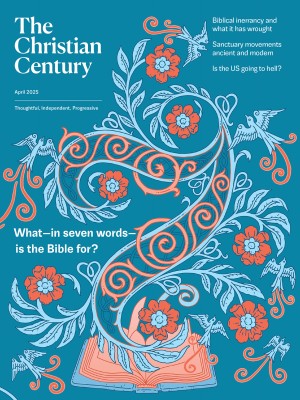A Hebrew scholar rekindles her love for classic Bible stories
Julie Faith Parker reads the Bible without guilt or shame, leading readers toward a healthier way of relating to scripture.

Eve Isn’t Evil
Feminist Readings of the Bible to Upend Our Assumptions
Feminist biblical scholarship, once relegated to the sidelines, is now solidly mainstream. Each year, more books, podcasts, and documentaries emerge to challenge the traditional patriarchal readings of the Bible and offer liberatory alternatives. Within such a landscape, it can be hard for a new book to stand out. But Eve Isn’t Evil is a gift. This insightful volume will delight even the most well-read with its cleverness and creativity, making it a commendable choice for readers interested in fresh new approaches to classic Bible stories.
Julie Faith Parker is a visiting scholar at Union Theological Seminary and biblical scholar in residence at Marble Collegiate Church in New York, and Eve Isn’t Evil is written to her strengths: her focus is almost entirely on the Hebrew scriptures. Parker delves into texts with an unparalleled talent for making Hebrew clear and accessible to a lay audience. She continually fills in important historical and cultural context for the less well versed, while keeping her analysis engaging even for advanced readers. A helpful “Bible Basics” appendix provides additional background for those unfamiliar with the texts. Anyone interested in feminist interpretations of scripture—from newcomers to specialists—will find value in Parker’s writing.
Read our latest issue or browse back issues.
Parker takes on some of the most familiar (and challenging) stories within scripture, bringing in recent discoveries and new perspectives to challenge traditional misogynistic interpretations. She offers surprising insights, often turning the assumed lesson of the story on its head. “Instead of seeing Eve as the trashy temptress who brings original sin into the world, we can understand her as the pinnacle of creation,” Parker notes in the first chapter. Her creative retelling of Genesis 1–3 begins like this:
Long ago and far away, the world met a God who was wondrous. She had the amazing ability to do with her words what women do with their bodies: create life. On Day 1, God decided it was time. Time to explode into the world by forming it. She knew about chaos because those swirlings were of her—but now there would be light—like the shining energy a baby sees when she pops forth from her mother’s birth canal. The messy waters burst suddenly—and there is light and life!
Such interpretations, with their insistence on reading without guilt or shame, may help readers from conservative churches find a healthier way of relating to scripture.
In addition to her scholarly expertise, Parker draws on personal experience to view biblical stories in new ways. A chapter called “Think Your Family’s a Mess? Biblical Families R Us” offers a creative, insightful, and provocative juxtaposition between Parker’s son, who is on the autism spectrum, and Jacob’s son Joseph. This chapter emerged from a conversation Parker had with her daughter, who read the biblical story and couldn’t help but see similarities between Joseph and her brother. While autism is a modern concept that ancient audiences would not have understood as we do, Parker’s writing demonstrates that there is tremendous value in opening up scripture so that people today can find themselves in it.
Her last chapter is on Jesus as her “favorite feminist Jew,” but it also addresses some of the New Testament’s troubling statements about women. For instance, she shares the humorous way she helps her students understand how the household codes “seek to establish hierarchies that run counter to the egalitarian Jesus movement.” She highlights recent scholarship on Mary Magdalene that suggests “Magdalene” was a title given by Jesus rather than the name of a town. She includes an interview with New Testament scholar Elizabeth Schrader Polczer in which the two of them reflect together on 2,000 years of exclusion—an exclusion rooted not in well-founded scriptural analysis but in misunderstanding (see “Signs of Mary Magdalene in John 11,” November 2023).
Each chapter of the book ends with three questions for reflection and conversation. Here I found myself disappointed. The reflection questions don’t prompt readers to develop their own interpretations, and they lack the biblical and theological depth that abounds elsewhere in the book. Parker’s writing is so consistently thoughtful that groups will undoubtedly have valuable discussions about the book—but they might want to come up with their own discussion questions.
Parker’s general hermeneutic approach is one of curiosity, humility, and openness. She looks beyond the literal to probe the ways scripture can speak to us in our own lives and contexts. She asks, “What truths are there for me in this passage? What can I learn from this story through deeper investigation? How do I embrace or resist this text to affirm God’s will for love and life?” Such questions are noble, and they model a spiritually vibrant way of approaching the Old Testament, one that’s rooted in curiosity. For readers who have had scripture wielded against them as a kind of cosmic rulebook, this approach may be healing. For all readers, Parker enlivens scripture with her rich, creative interpretations. Above all, Eve Isn’t Evil kindles a love for the Bible, in all its messiness and particularity.





